Unit 4 I used to be afraid of the dark.Section A(Grammar Focus-4c)课件(共31张PPT)
文档属性
| 名称 | Unit 4 I used to be afraid of the dark.Section A(Grammar Focus-4c)课件(共31张PPT) | 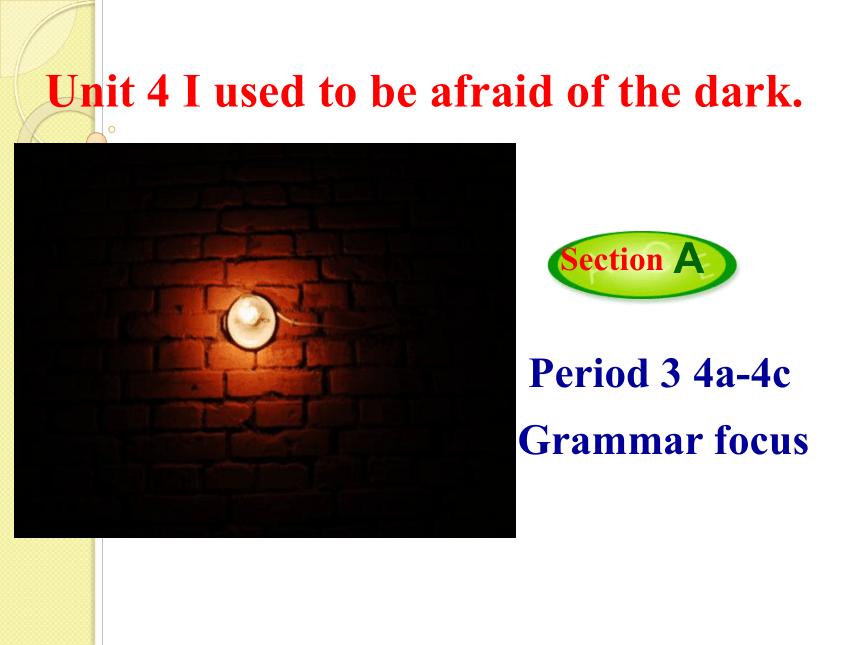 | |
| 格式 | zip | ||
| 文件大小 | 536.3KB | ||
| 资源类型 | 教案 | ||
| 版本资源 | 人教新目标(Go for it)版 | ||
| 科目 | 英语 | ||
| 更新时间 | 2021-10-19 20:48:30 | ||
图片预览

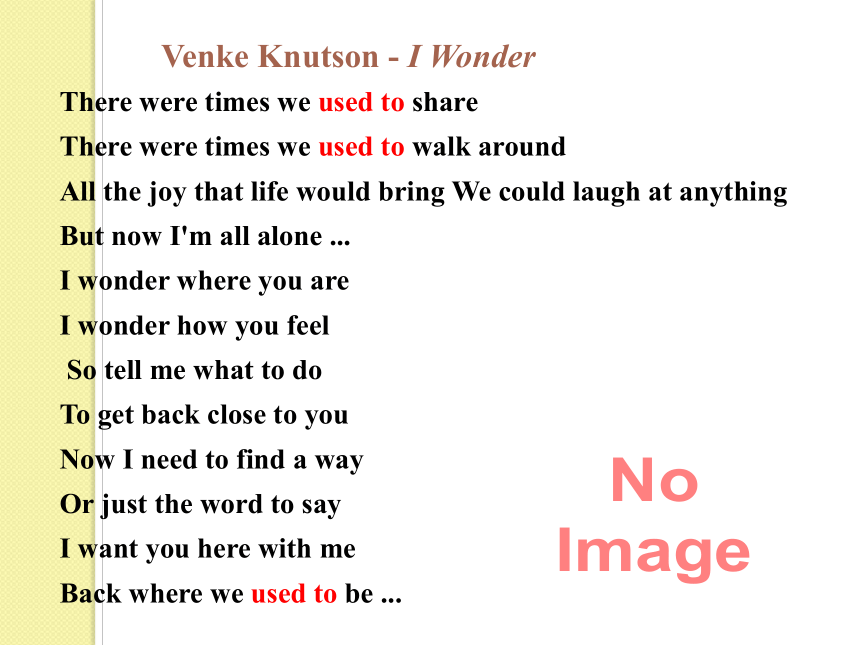

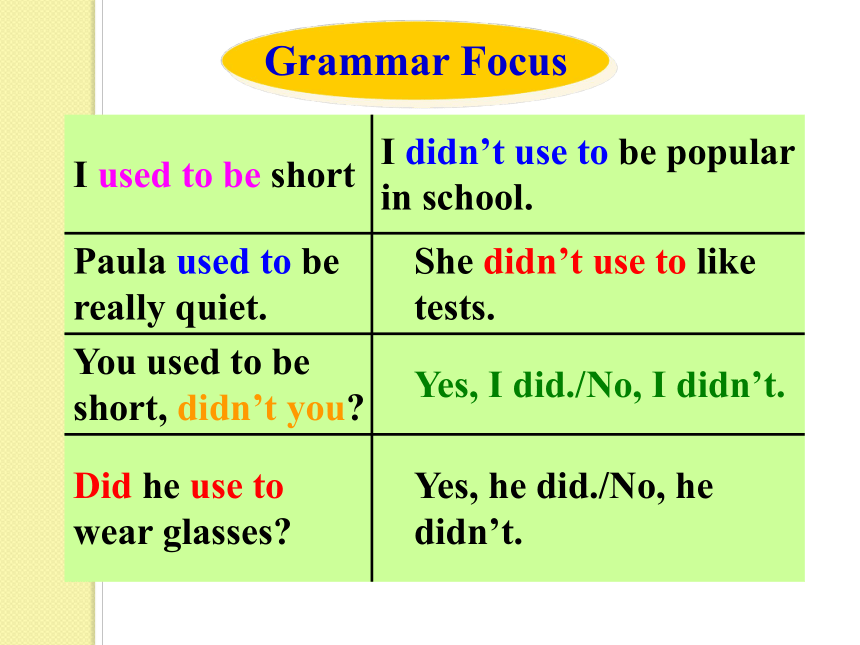

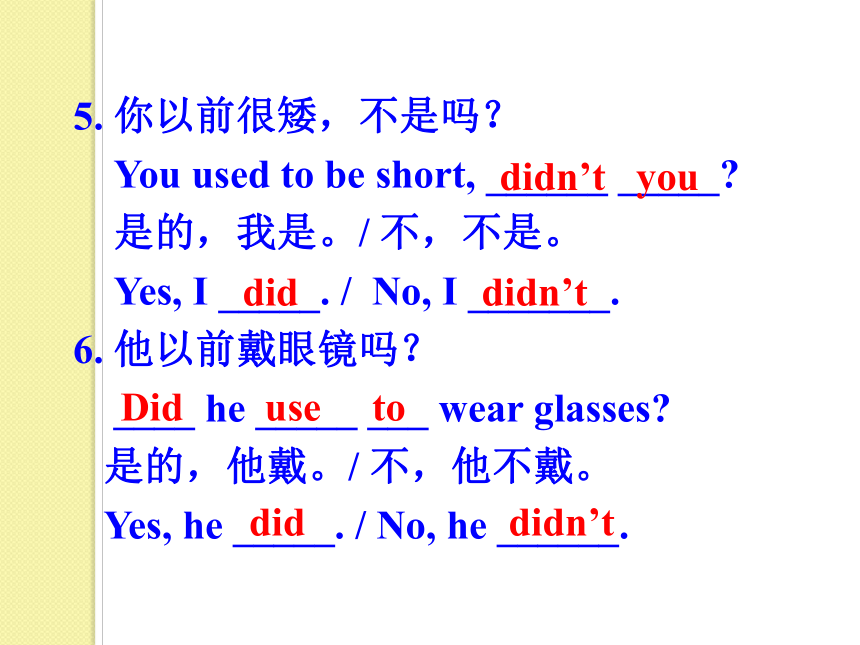
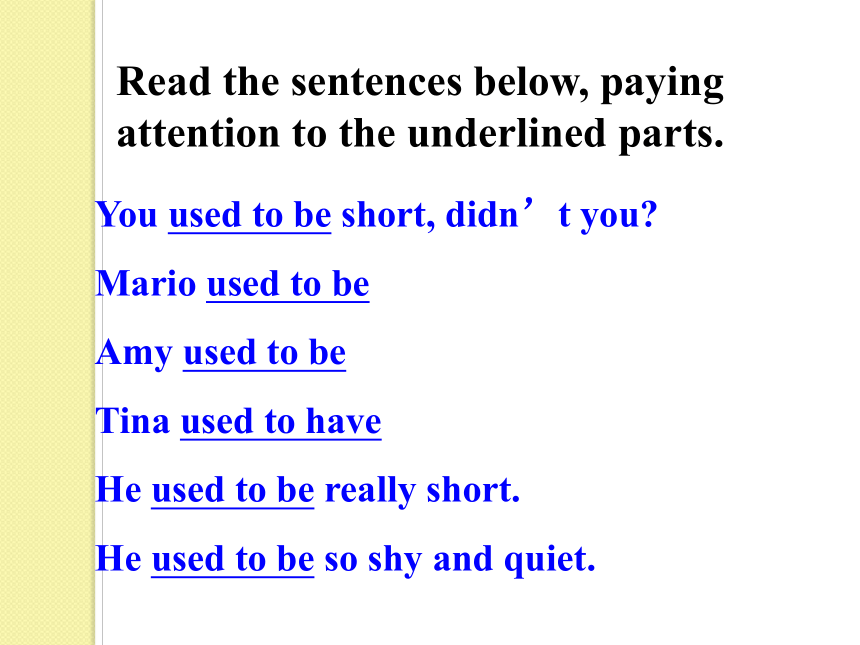

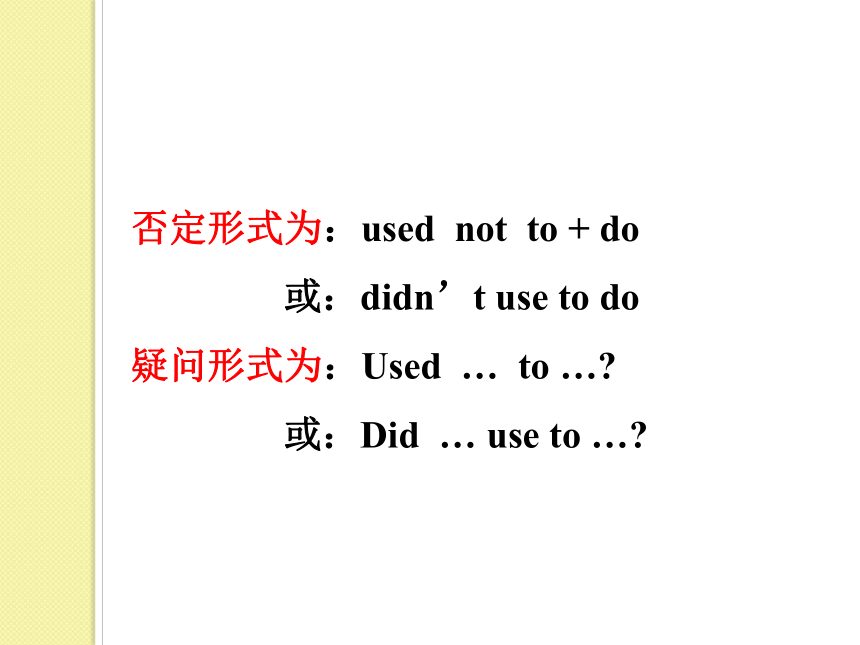
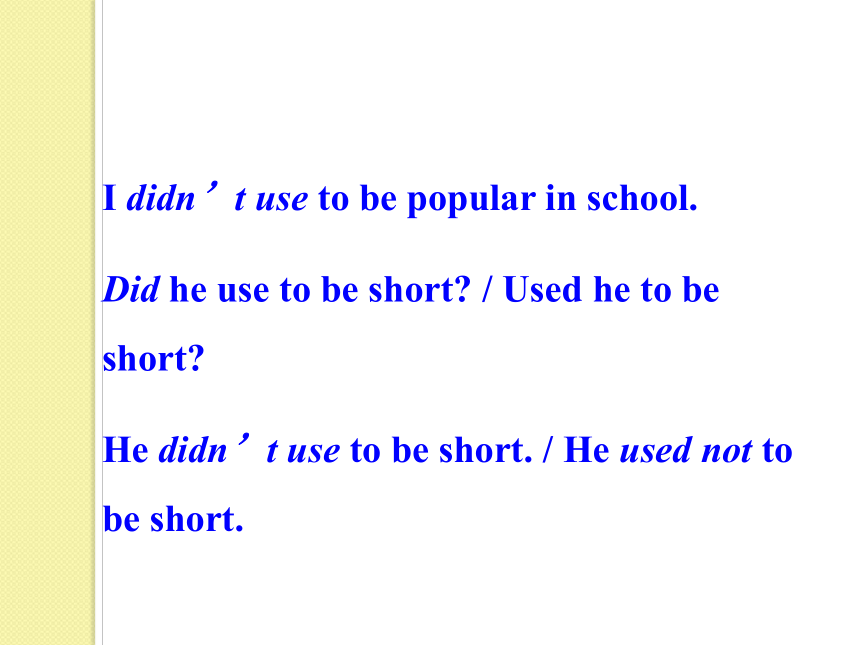
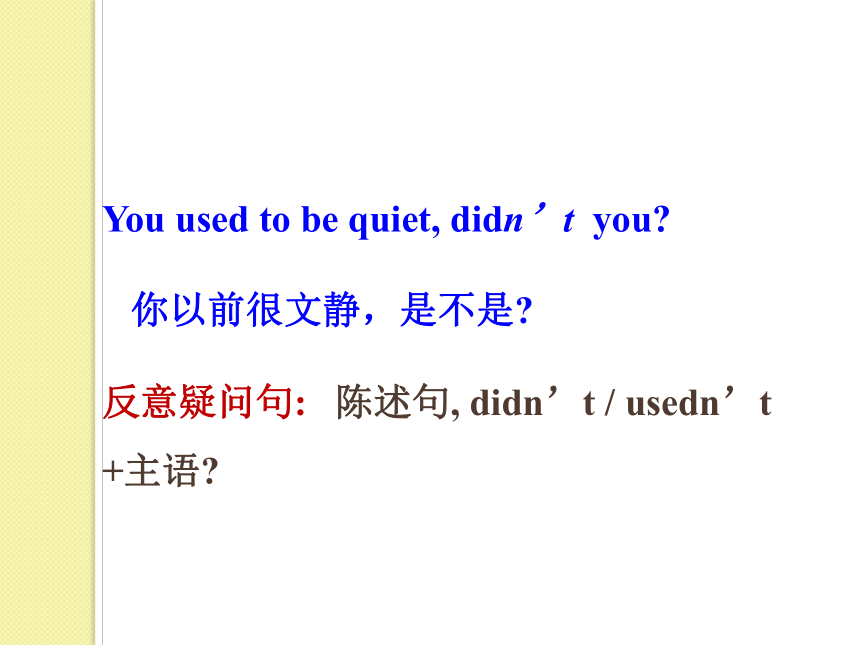
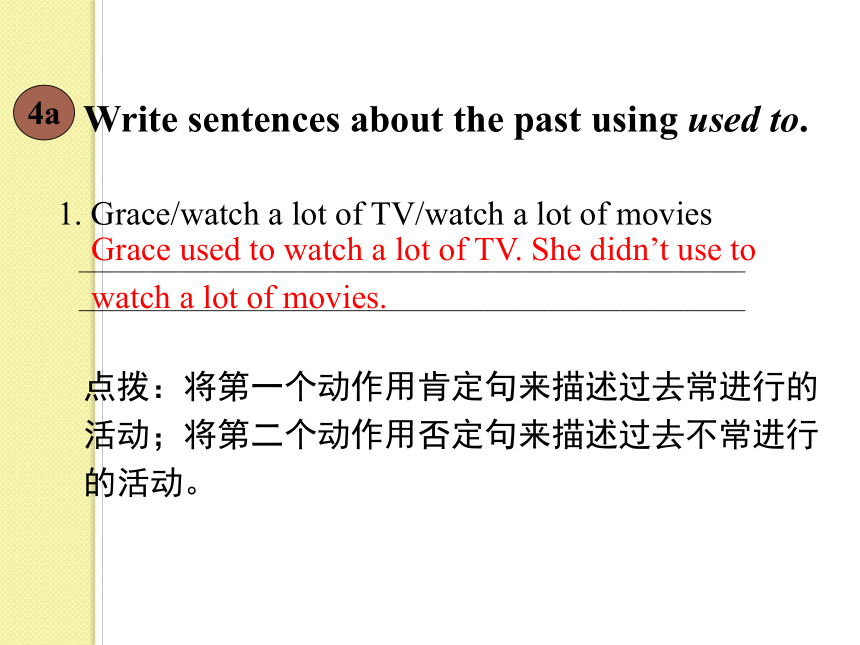
文档简介
(共31张PPT)
Period 3 4a-4c
Grammar focus
Section
A
Unit 4 I used to be afraid of the dark.
There were times we used to share
There were times we used to walk around
All the joy that life would bring We could laugh at anything
But now I'm all alone ...
I wonder where you are
I wonder how you feel
So tell me what to do
To get back close to you
Now I need to find a way
Or just the word to say
I want you here with me
Back where we used to be ...
Venke Knutson - I Wonder
1. shy (名词) ___________
2. possible (反义词) ____________
3. Asia (形容词) _________
4. success (动词) __________
5. 敢于做某事 (汉译英) _______________
6. 应付;处理(汉译英)________
7. 不再 (汉译英) ________________
Revision
◆按要求写出下列词汇或词组。
dare to do sth.
shyness
Asian
impossible
succeed
deal with
not…anymore
I used to be short I didn’t use to be popular in school.
Paula used to be really quiet. She didn’t use to like tests.
You used to be short, didn’t you Yes, I did./No, I didn’t.
Did he use to wear glasses Yes, he did./No, he didn’t.
Grammar Focus
根据课本内容,完成下列句子。
1. 我以前是矮个子。
I ______ ____ be short.
2. 我以前在学校不受欢迎。
I ______ _____ to be popular in school.
3. 保拉以前的确不爱说话。
Paula _____ ____ be really quiet.
4. 她以前不喜欢小测验。
She _____ ___ ___ like tests.
Grammar Focus
didn’t use
used to
used to
didn’t use to
5. 你以前很矮,不是吗?
You used to be short, ______ _____
是的,我是。/ 不,不是。
Yes, I _____. / No, I _______.
6. 他以前戴眼镜吗?
____ he _____ ___ wear glasses
是的,他戴。/ 不,他不戴。
Yes, he _____. / No, he ______.
didn’t you
Did use to
did didn’t
did didn’t
You used to be short, didn’t you
Mario used to be
Amy used to be
Tina used to have
He used to be really short.
He used to be so shy and quiet.
Read the sentences below, paying attention to the underlined parts.
I used to be afraid of the dark.
我过去怕黑。
“used to + 动词原形”表过去的习惯或过
去经常反复发生的动作或状态,但现在已经不再存在了。可用于所有人称。
否定形式为:used not to + do
或:didn’t use to do
疑问形式为:Used … to …
或:Did … use to …
I didn’t use to be popular in school.
Did he use to be short / Used he to be short
He didn’t use to be short. / He used not to be short.
You used to be quiet, didn’t you
你以前很文静,是不是
反意疑问句: 陈述句, didn’t / usedn’t +主语
4a
Write sentences about the past using used to.
1. Grace/watch a lot of TV/watch a lot of movies
______________________________________________________________
______________________________________________________________
点拨:将第一个动作用肯定句来描述过去常进行的活动;将第二个动作用否定句来描述过去不常进行的活动。
Grace used to watch a lot of TV. She didn’t use to watch a lot of movies.
2. my mom/have curly hair/have straight hair
______________________________________
______________________________________
3. Jerry/read books on European history/
read books on African culture
___________________________________________________________
___________________________________________________________
Jerry used to read books on European history.
adj. 欧洲 (人)的
n. 欧洲人
adj. 非洲 (人)的
n. 非洲人
My mom used to have curly hair. She didn’t use to have straight hair.
She didn’t use to read books on African culture.
4. Sandy /teach British English / teach American English
__________________________________
__________________________________
Sandy used to teach British English.
She didn’t use to teach American English.
adj. 英国(人)的
Five years ago Now
didn’t eat a lot of vegetables loves carrots and tomatoes
listened to pop music enjoys country music
watched scary movies hates scary movies
didn’t read a lot of books reads at least six books a year
Look at the information and write sentences about Emily.
4b
e.g.
1.Emily didn’t use to eat a lot of vegetables,
but now she loves carrots and tomatoes.
2. Emily used to listen to pop music,
but now she enjoys country music.
Which of these things did you use to be afraid of Which ones are you still afraid of Check the boxes and then ask your partner.
4c
Me I used to be afraid of… I’m still
afraid of…
the dark
being alone
flying
high places
giving a speech in public
My partner My partner used to be afraid of… My partner is still afraid of…
the dark
being alone
flying
high places
giving a speech in public
Work on 4c
小组合作
A: Did you use to be afraid of …
B: Yes, I did. I used to be afraid of …
/No, I didn’t. I didn’t use to be afraid of ...
C: Are you still afraid of …
B: Yes, I am. I am still afraid of …
/No, I am not. I am not still afraid of ...
请给Emily写一封信,向她介绍你的改变,
包括你的外貌,性格,爱好,周末活动等等。
Writing practice(写作练习)
Dear Emily,
My name is ... I used to be…, but now I am…
I used to have…, but now I have… I used to … on weekends, but now I … on weekends...
Inquiry into knowledge by translation
一、1. As she got better, she dared to sing in front of her class.
______________________________________________
2. As rain has fallen, the air is cooler.
______________________________________________
(1) as引导_______ 从句,作“_______”解,有“随着……”之意,与while意义相近,强调两个动作同时发生;或某事一发生,另一事立即发生。As也可用作连词引导_______从句,含义是“_______”,同时as也可作介词,意思是“_______”。
①他一边往前跑,一边高声地呼喊。
He _______ _______ _______ he ran along.
②他五年前以游客的身份来过中国。
He came to China _______ _______ _______ five years ago.
当她好点的时候,她敢于在全班面前唱歌。
因为下过雨,空气比较清爽。
时间状语 当……时候
原因状语
因为,由于
作为
shouted aloud as
as a tourist
二、1. I have to be very careful about what I say or do.
_______________________________________
2. Be careful about fires!
_______________________________________
3. Be careful not to wake the baby.
_______________________________________
从以上几个句子可以看出be careful意为“________”,be careful about译为“_________________”相当于__________。be careful可以跟_______和从句。
你必须多加小心那些不诚实的人。
You must be very careful _______ _______ _______ _______.
我得当心我该说什么或做什么。
小心火烛!
注意别吵醒了宝宝。
小心,当心
be afraid of
不定式
about those
men
注意,担心,讲究……
dishonest
三、1. Only a very small number of people make it to the top.
_______________________________________________
2. I just made it to my class at last.
_______________________________________________
Make it在这里表示“____________”,还表示“____________”和表示约定_______,地点等。
①你不必担心,他会办成的。
You needn’t worry, he _______ ________ ________.
②火车再有五分钟就开了——我们绝对赶不上了。
The train leaves in five minutes — we’ll _______ _______ _______.
③我们约定在8点半吧,这对你合适吗?
_______ ________ _______ _______ 8:30. Is that all right for you
只有一小部分人能够成功到达山顶。
最终,我成功地按时赶到学校。
某人做成某事
及时赶上火车
时间
will make it
never make
Let’s make it at
it
The end-of- class test
一、用所给单词的适当形式填空。
1. He used to take up _______ (play) sports to keep healthy.
2. The students didn’t dare _______ (break) the school rules.
3. We have to be careful about _______ (say) something wrong.
4. Many times they thought about _______ (work) hard to succeed.
5. At last, he succeeded _______ (deal) with his shyness.
playing
to break
saying
working
dealing
1. My uncle ________ live in a
big city but he ________
living in a village now.
I _______ get up late when
I was in the middle school.
used to
is used to
used to
用 used to 和 be used to 的适当
形式填空。
3. My sister loves her job very much
and she __________ the lifestyle of
an air hostess.
4. The child _________ watch too much
TV at night. So he has poor eyesight
now.
5. We students ___________ doing
morning exercises every day.
is used to
used to
are used to
6. Her father is a teacher now. But he ________ be a worker.
7. I never go to school by bike. I __________ taking a bus to school.
8. We _______ play badminton twice
a week. But we are so busy that we
haven’t enough time to play it now.
used to
am used to
used to
9. — Are you a teacher now
— No. But I ________ be.
10. Tina often works till nearly midnight.
She _________ working at night now.
11. There ________ be a school here but
now we can’t find it.
used to
is used to
used to
Homework
调查你的家庭成员以前害怕的事情,并写成一个小报告。
Period 3 4a-4c
Grammar focus
Section
A
Unit 4 I used to be afraid of the dark.
There were times we used to share
There were times we used to walk around
All the joy that life would bring We could laugh at anything
But now I'm all alone ...
I wonder where you are
I wonder how you feel
So tell me what to do
To get back close to you
Now I need to find a way
Or just the word to say
I want you here with me
Back where we used to be ...
Venke Knutson - I Wonder
1. shy (名词) ___________
2. possible (反义词) ____________
3. Asia (形容词) _________
4. success (动词) __________
5. 敢于做某事 (汉译英) _______________
6. 应付;处理(汉译英)________
7. 不再 (汉译英) ________________
Revision
◆按要求写出下列词汇或词组。
dare to do sth.
shyness
Asian
impossible
succeed
deal with
not…anymore
I used to be short I didn’t use to be popular in school.
Paula used to be really quiet. She didn’t use to like tests.
You used to be short, didn’t you Yes, I did./No, I didn’t.
Did he use to wear glasses Yes, he did./No, he didn’t.
Grammar Focus
根据课本内容,完成下列句子。
1. 我以前是矮个子。
I ______ ____ be short.
2. 我以前在学校不受欢迎。
I ______ _____ to be popular in school.
3. 保拉以前的确不爱说话。
Paula _____ ____ be really quiet.
4. 她以前不喜欢小测验。
She _____ ___ ___ like tests.
Grammar Focus
didn’t use
used to
used to
didn’t use to
5. 你以前很矮,不是吗?
You used to be short, ______ _____
是的,我是。/ 不,不是。
Yes, I _____. / No, I _______.
6. 他以前戴眼镜吗?
____ he _____ ___ wear glasses
是的,他戴。/ 不,他不戴。
Yes, he _____. / No, he ______.
didn’t you
Did use to
did didn’t
did didn’t
You used to be short, didn’t you
Mario used to be
Amy used to be
Tina used to have
He used to be really short.
He used to be so shy and quiet.
Read the sentences below, paying attention to the underlined parts.
I used to be afraid of the dark.
我过去怕黑。
“used to + 动词原形”表过去的习惯或过
去经常反复发生的动作或状态,但现在已经不再存在了。可用于所有人称。
否定形式为:used not to + do
或:didn’t use to do
疑问形式为:Used … to …
或:Did … use to …
I didn’t use to be popular in school.
Did he use to be short / Used he to be short
He didn’t use to be short. / He used not to be short.
You used to be quiet, didn’t you
你以前很文静,是不是
反意疑问句: 陈述句, didn’t / usedn’t +主语
4a
Write sentences about the past using used to.
1. Grace/watch a lot of TV/watch a lot of movies
______________________________________________________________
______________________________________________________________
点拨:将第一个动作用肯定句来描述过去常进行的活动;将第二个动作用否定句来描述过去不常进行的活动。
Grace used to watch a lot of TV. She didn’t use to watch a lot of movies.
2. my mom/have curly hair/have straight hair
______________________________________
______________________________________
3. Jerry/read books on European history/
read books on African culture
___________________________________________________________
___________________________________________________________
Jerry used to read books on European history.
adj. 欧洲 (人)的
n. 欧洲人
adj. 非洲 (人)的
n. 非洲人
My mom used to have curly hair. She didn’t use to have straight hair.
She didn’t use to read books on African culture.
4. Sandy /teach British English / teach American English
__________________________________
__________________________________
Sandy used to teach British English.
She didn’t use to teach American English.
adj. 英国(人)的
Five years ago Now
didn’t eat a lot of vegetables loves carrots and tomatoes
listened to pop music enjoys country music
watched scary movies hates scary movies
didn’t read a lot of books reads at least six books a year
Look at the information and write sentences about Emily.
4b
e.g.
1.Emily didn’t use to eat a lot of vegetables,
but now she loves carrots and tomatoes.
2. Emily used to listen to pop music,
but now she enjoys country music.
Which of these things did you use to be afraid of Which ones are you still afraid of Check the boxes and then ask your partner.
4c
Me I used to be afraid of… I’m still
afraid of…
the dark
being alone
flying
high places
giving a speech in public
My partner My partner used to be afraid of… My partner is still afraid of…
the dark
being alone
flying
high places
giving a speech in public
Work on 4c
小组合作
A: Did you use to be afraid of …
B: Yes, I did. I used to be afraid of …
/No, I didn’t. I didn’t use to be afraid of ...
C: Are you still afraid of …
B: Yes, I am. I am still afraid of …
/No, I am not. I am not still afraid of ...
请给Emily写一封信,向她介绍你的改变,
包括你的外貌,性格,爱好,周末活动等等。
Writing practice(写作练习)
Dear Emily,
My name is ... I used to be…, but now I am…
I used to have…, but now I have… I used to … on weekends, but now I … on weekends...
Inquiry into knowledge by translation
一、1. As she got better, she dared to sing in front of her class.
______________________________________________
2. As rain has fallen, the air is cooler.
______________________________________________
(1) as引导_______ 从句,作“_______”解,有“随着……”之意,与while意义相近,强调两个动作同时发生;或某事一发生,另一事立即发生。As也可用作连词引导_______从句,含义是“_______”,同时as也可作介词,意思是“_______”。
①他一边往前跑,一边高声地呼喊。
He _______ _______ _______ he ran along.
②他五年前以游客的身份来过中国。
He came to China _______ _______ _______ five years ago.
当她好点的时候,她敢于在全班面前唱歌。
因为下过雨,空气比较清爽。
时间状语 当……时候
原因状语
因为,由于
作为
shouted aloud as
as a tourist
二、1. I have to be very careful about what I say or do.
_______________________________________
2. Be careful about fires!
_______________________________________
3. Be careful not to wake the baby.
_______________________________________
从以上几个句子可以看出be careful意为“________”,be careful about译为“_________________”相当于__________。be careful可以跟_______和从句。
你必须多加小心那些不诚实的人。
You must be very careful _______ _______ _______ _______.
我得当心我该说什么或做什么。
小心火烛!
注意别吵醒了宝宝。
小心,当心
be afraid of
不定式
about those
men
注意,担心,讲究……
dishonest
三、1. Only a very small number of people make it to the top.
_______________________________________________
2. I just made it to my class at last.
_______________________________________________
Make it在这里表示“____________”,还表示“____________”和表示约定_______,地点等。
①你不必担心,他会办成的。
You needn’t worry, he _______ ________ ________.
②火车再有五分钟就开了——我们绝对赶不上了。
The train leaves in five minutes — we’ll _______ _______ _______.
③我们约定在8点半吧,这对你合适吗?
_______ ________ _______ _______ 8:30. Is that all right for you
只有一小部分人能够成功到达山顶。
最终,我成功地按时赶到学校。
某人做成某事
及时赶上火车
时间
will make it
never make
Let’s make it at
it
The end-of- class test
一、用所给单词的适当形式填空。
1. He used to take up _______ (play) sports to keep healthy.
2. The students didn’t dare _______ (break) the school rules.
3. We have to be careful about _______ (say) something wrong.
4. Many times they thought about _______ (work) hard to succeed.
5. At last, he succeeded _______ (deal) with his shyness.
playing
to break
saying
working
dealing
1. My uncle ________ live in a
big city but he ________
living in a village now.
I _______ get up late when
I was in the middle school.
used to
is used to
used to
用 used to 和 be used to 的适当
形式填空。
3. My sister loves her job very much
and she __________ the lifestyle of
an air hostess.
4. The child _________ watch too much
TV at night. So he has poor eyesight
now.
5. We students ___________ doing
morning exercises every day.
is used to
used to
are used to
6. Her father is a teacher now. But he ________ be a worker.
7. I never go to school by bike. I __________ taking a bus to school.
8. We _______ play badminton twice
a week. But we are so busy that we
haven’t enough time to play it now.
used to
am used to
used to
9. — Are you a teacher now
— No. But I ________ be.
10. Tina often works till nearly midnight.
She _________ working at night now.
11. There ________ be a school here but
now we can’t find it.
used to
is used to
used to
Homework
调查你的家庭成员以前害怕的事情,并写成一个小报告。
同课章节目录
- Unit 1 How can we become good learners.
- Section A
- Section B
- Unit 2 I think that mooncakes are delicious!
- Section A
- Section B
- Unit 3 Could you please tell me where the restroom
- Section A
- Section B
- Unit 4 I used to be afraid of the dark.
- Section A
- Section B
- Unit 5 What are the shirts made of?
- Section A
- Section B
- Review of Units 1-5
- Unit 6 When was it invented?
- Section A
- Section B
- Unit 7 Teenagers should be allowed to choose their
- Section A
- Section B
- Unit 8 It must belong to Carla.
- Section A
- Section B
- Unit 9 I like music that I can dance to.
- Section A
- Section B
- Unit 10 You're supposed to shake hands.
- Section A
- Section B
- Review of Units 6-10
- Unit 11 Sad movies make me cry.
- Section A
- Section B
- Unit 12 Life is full of the unexpected
- Section A
- Section B
- Unit 13 We're trying to save the earth!
- Section A
- Section B
- Unit 14 I remember meeting all of you in Grade 7.
- Section A
- Section B
- Review of Units 11-14
